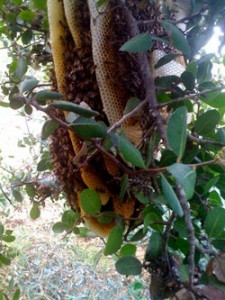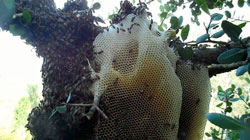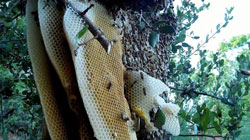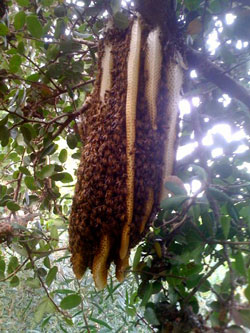What to Do if You Find a Bee Swarm
A year or two ago in spring I encountered a bee swarm in my garden. They had been living in an owl house high up in one of my trees, but in spring a large number of them swarmed. Bees proliferate at a rapid rate, thus occasionally a swarm of them congregate and fly away together with their queen to find a new home, usually in spring. I found this particular swarm gathered together like a big ball of bees at the foot of one of my pine trees.
I grew up on a farm so I knew not be afraid of a bee swarm. Bees can interpret fearful feelings and vibrations as being similar to anger. When they sense these emotions they often become agitated, making loud buzzing sounds and flying around more rapidly. But bees have no animosity towards us unless they think we are threatening to attack their hive. African bees are more territorial than European bees. They will attack anyone that threatens their hive, and they often interpret loud machinery as just such a threat. But a swarm is not the same thing as a hive. A hive is a place where bees have settled down to make a home, gather honey, and raise offspring. A swarm is simply a new group of bees on the move looking for a new home. Bees do not attack to protect the swarm unless someone actively attacks them, for example by spraying the swarm with insecticide or even water. Please don’t spray since this may harm the queen. Also, spraying water may make the queen decide she will start laying. Then the bees will not leave. Spraying Africanized bees is highly dangerous. One might even get killed. A swarm is not dangerous unless attacked, but it does require sensibleaction.
When I found the swarm in my garden I knew these bees might very likely be Africanized bees and not European bees. Nonetheless, I did not call in a pest control company because bees are not pests. Pesticide companies kill bees, but good beekeepers catch bees and then they provide them with an appropriate hive and manage them properly. Even Africanized bees become easy to handle if you remove their Africanized queen and substitute a European queen. Once you introduce a European queen they calm right down.
In the case of the swarm I found, I contacted my gardener. He had been a beekeeper all his life and respected the sacred life of bees and would be glad to have the bees. He brought a wooden box to my garden and using smoke to subdue the bees, he took out the queen and put her into the box. The rest of the bees followed and he and took them home to Mexico where he has many beehives and collects and sells the honey.
For those who live in San Diego and environs I suggest you call Pete Holtzen, Honeybee Rescue, 619/286-7258. If Pete cannot help you, he may be able to suggest other beekeepers to catch and preserve bees if you find a swarm on your property. If you discover a swarm that has made a home in an unwanted place such as the eaves of your house, it is imperative that you get them out of there right away before they set up housekeeping. A good beekeeper will come and find the queen, put her into a box nearby, and all the bees will quickly join her. This is the way to get the bees out of your house or shed and not by using poisons.






In North County, you may contact Brother Blaise at the *Prince of Peace Abbey to collect your bees. He has been keeping bees for more than 40 years, and is extremely knowledgeable. Last week he came over to our home to collect a swarm that had approximately 20,000 bees in it. It was our second large swarm in three years, possibly because we have a large variety of fruit trees in our garden.
Below is an excerpt from a recent article that was written March 21, 2010 by NC Times staff writer Jeff Rowe:
In Oceanside, veteran beekeeper Brother Blaise also is expecting good honey production.
The Benedictine monk at the Prince of Peace Abbey has been raising bees and producing honey for sale for 40 years —- until the bees started dying off or leaving the hives in recent years.
Blaise said he is sure he had the mites under control. He thinks cell phone transmissions may have had something to do with the deaths and disappearance of his bees.
About 10 years ago, the abbey leased a high point of its land to a cell phone service company for transmission towers. The lease helps the abbey pay its bills, but Blaise’s bees began to die off after the towers went up.
A few months ago, he moved his hives to the other side of the abbey property where hills block transmissions from the cell towers. Since then, he has restored about 25 of his original 100 colonies.
Research on cell phone transmissions and bees is inconclusive, said Eric Mussen, a bee specialist at UC Davis. What is certain is that bees pollinate about one-third of the food crops consumed in the United States; at the abbey, the bees fertilize the 85 fruit trees that provide food for the priests, monks and visitors.
Kellum, the agricultural scientist with the San Diego County Agricultural Commissioner, said many factors are involved in colony collapse disorder, but he doesn’t think cell phone transmissions are among them.
Blaise’s bees now are the aggressive Africanized variety, picked up from around the area where people have asked him to clear out their infestations. He said he typically makes two pickups a day and his colonies are fully restored.
He plans to requeen his colonies with the more docile European honey bees. But for now, his hopes hinge on the surly Africanized bees.
Whatever the cause and whatever the cure of colony collapse disorder, Blaise’s colonies clearly are vigorous, focused on the honey making and intolerant of visitors. On a recent visit, they swarmed over Blaise and a visitor.
*Brother Blaise, Prince of Peace Abbey
650 Benet Hill Road
Oceanside, CA 92058-1253
(760) 967-4200
Dear Diana:
Thank you so much for this comment on bees and information on Brother Blaise and bee swarms. Many thanks, also, for the information on transmission lines. The fact that Brother Blaise’s bees did better when they were moved sounds suspiciously as if one factor influencing bees adversely might be radio waves necessary for cell phones.
Our modern advances—things we once did without and never missed, often screw up the environment and lead to more problems than they solve. Meanwhile, we’ve become so dependent on the new gadgets, we can’t get rid of them. It would be most interesting to hang around for a few hundred years and see where it will all end up. (“Sub specii aeternitatus” said Spinoza, meaning to look at life “under the aspect of Eternity.”) Meanwhile, we gardeners simply plug along doing our best to preserve the environment as best we can and hope we are doing just a little good, though we wish it were much more.
I live in East County (La Mesa)…a swarm has settled on my screen door…they have been there all day…a bee keeper removal said they may leave @ dusk. They are still around. I did not know any of the above info. Thank you for that.
Do you know of someone I could contact if they are still around in the morning?
I can see how you might be very nervous having a bee swarm on your screen door, but yes, they might leave at dusk. Then they will be someone else’s problem. (In the meanwhile, they do not constitute a hazard for now and I hope you have another door so you can go in and out of your house.) What would be bad would be if the bees found a hole under the eaves of your house and went into the walls. I hope that does not happen. I suggest you try to contact someone today even though it is Sunday.
If a bee keeper came to your home he would subdue the bees with smoke. Dusk is a good time to do this since the bees are more subdued at dusk anyway. He would then find the young queen inside the swarm and take this young queen out from the middle of the swarm and put her into a cardboard box. He would then sit around and wait until the bee swarm would follow the young queen into the box. Then he would close the box and carry it away.
That’s all there is to it, but bee keepers also have protective clothing and they have been slowly subjected to bee stings so they have developed an immunity to them. (Bee stings are beneficial since bee keepers usually do not suffer from arthritis as result. Bee stings are a cure for arthritis.)
There is a man in San Diego County, Pete Holtzen, Honey Bee Rescue, 619/286-7258 (or http://www.honeybeerescue.com) who takes bees away, but he may charge for this. Ask him his charges. In my opinion it is well worthwhile to pay the cost of having a knowledgeable bee keeper come to one’s home and have some assurance that the keeper will keep the bees and not waste the swarm. Don’t use pesticides to get rid of bees. Pest companies kill bees with Sevin. We should not kill bees, and also pesticides such as Sevin are broad-spectrum pesticides. They kill other things in the environment. You do not want pesticides used around your home or screen door where people, animals, and beneficial insects and arachnids can be affected.
Pete keeps the bees instead of destroying them. Some bee keepers think of swarming bees as “junk bees.” There are no junk bees. We need all the bees we can get and should save swarms and not kill these highly beneficial creatures who help us all stay alive on this planet Earth. Thank you very much for writing to my blog and getting the facts on this matter. Isn’t it funny how emergencies always seem to happen on weekends? I wish you luck and hope you can still enjoy the humor and interest of this situation.
I was just mowing my grass by the fence and the pool and a large swarm came out and attacked me..i went running and screaming and luckily only came away with 5 stings..
They have decided to be in my double sided wood fence!! Im upset because my young daughter was stung last week as well as my dog and myself now..I hate to say it but the bees have to go! Im afraid to go in my own yard. This is the second time we will have to remove them. Any ideas on how to keep them from coming back to the same location in the fence? Please help!
Thank you for this information. We have a swarm that has formed on a small tree next to our driveway. I will be calling the people you recommended if hey do not leave.
Thank you for acting responsibly to save the bees!
I work at a homeowners association and, unfortunately, killing bee bundles several times a year due to liability issues until I read your article. I called up Pete from Honeybee Rescue and saved approx. 10,000 bees from being exterminated. I am very grateful for the information and I will continue to call on Pete. Thanks again.
Holly
This is wonderful news! How glad I am to hear what you have been doing. I am very grateful to you for getting rid of bees in a safe way without harming the bees.
Called Pete this morning and he came within 30 minutes to collect the bees that were making a hive in our almond tree. I’m so happy to have found him on your website! Thanks!
Thank you so much for this comment. I wish there was someone like Pete saving bees in every town nationwide.
First of all do not panic when you You Find a Bee Swarm in or around your property. Just make a call to a bee removal expert that available in your area. This is only advice like to give. Many Thanks for sharing such an useful and information post. Nice to read it. Keep sharing.
We came across a hive while doing yard work. It is in a palm tree about nine feet above ground. We are thinking to just leave it there and wait until they go away to trim the tree. But will they go away? Should we be concerned that the eaves or such are next?
I am not in San Diego area but 1 1/2 hours away. The OC Fair starts real soon and I may see if someone in the OC Beekeepers Club wants them.
If the bees are swarming for the purpose of looking for a home, they will leave within a few hours. If they are happy they will stay indefinitely and not go away…ever! This means you will not be able to prune your palm tree…ever! If I were you I would get a bee-keeper to come and collect the bees. Do not hire a pesticide company, since they will kill the bees. We need to protect all bees. Your idea of asking the Orange County Beekeepers Club for advice is a good one.
Mulch was placed around the bottom of my new Queen Palm and now bees are all around the bottom of the tree.
Seem to be getting the water but they are only around one tree. We have a dog and I need to get rid of the bees.
Help.
Phone your local Humane Society for advice on finding someone to handle and take away the bees without killing them. Perhaps they are swarming. Your dog is most likely smart enough to stay away from them. If not, it will only take one bee sting to teach him or her to stay away and one bee sting is not fatal. Also phone the people who planted the tree and find out what is in the mulch that could be attracting bees. They should be able to fix the problem.